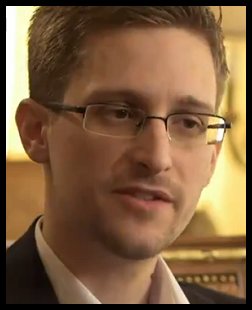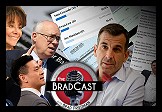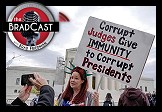 Almost three weeks ago, all three of the major Sunday network news shows --- NBC's Meet the Press, CBS' Face the Nation and ABC's This Week --- allowed very powerful elected officials, such as Sen. Dianne Feinstein (D-CA) and Rep. Mike Rogers (R-MI), to come on the air and claim, without evidence, that they'd seen "clues" suggesting former NSA contractor turned whistleblower Edward Snowden was, somehow, a Russian agent.
Almost three weeks ago, all three of the major Sunday network news shows --- NBC's Meet the Press, CBS' Face the Nation and ABC's This Week --- allowed very powerful elected officials, such as Sen. Dianne Feinstein (D-CA) and Rep. Mike Rogers (R-MI), to come on the air and claim, without evidence, that they'd seen "clues" suggesting former NSA contractor turned whistleblower Edward Snowden was, somehow, a Russian agent.
The officials were required to offer absolutely no evidence for their extraordinary claims on the three major broadcast networks. Snowden was subsequently forced to strongly rebut the scandalous charges, which are apparently straight out of the Nixon/Cold War era playbook.
While that sort of wholly substance-free red-baiting is now perfectly appropriate, seemingly, on network "news" shows, it's similarly remarkable that it seems those very same networks, and most of the others, obsessed with unsubstantiated bullshit claims about Snowden, failed to even note a full-length, detailed, substantive videotaped interview with Snowden on Germany television's ARD almost two weeks ago on January 26th.
Interestingly, on the ARD website, where the exclusive interview was originally posted, a note on the page explains cryptically: "Due to legal reasons the video is only available in Germany." Huh. So it can't be watched there from here in the U.S. Okay. So, here's the full interview as posted at LiveLeak...
Please decide for yourself if he's a "Russian agent", as based on his comments here and the actual public evidence that exists (none) to support the defamatory claims of the very powerful elected members of Congress. The entire interview is interesting and as fascinating as he is.
I'm not sure if it offers a lot of new information, in regard to Snowden's leaks (as he notes several times during the conversation, he's leaving it to the journalists to decide what is newsworthy and what isn't from amongst the documents which he reportedly no longer even has), but there's one section I wanted to underscore, as it's something we've discussed here for many years. Namely, the dangers of privatizing our national security/surveillance state, which he speaks to very directly in the interview...
SNOWDEN: That's a very difficult question to answer. Um, in general, I would say it highlights the dangers of privatizing government functions. I worked previously as an actual staff officer, a government employee for the Central Intelligence Agency, but I've also served much more frequently as a contractor in a private capacity. What that means is you have private for-profit companies doing inherently governmental work, like targeted espionage, surveillance, compromising foreign systems. And anyone who has the skills, who can convince a private company that they have the qualifications to do so, will be empowered by the government to do that and there's very little oversight. There's very little review.
...
INTERVIEWER: You worked for the NSA through a private contractor with the name Booz Allen Hamilton, one of the big ones in the business. What is the advantage for the U.S. Government or the CIA to work through a private contractor to outsource essential government functions?
SNOWDEN: Contracting culture of the national security community in the United States is a complex topic. It's driven by a number of interests between primarily limiting the number of direct government employees, at the same time as keeping lobbying groups in Congress --- typically from very well-funded businesses, such as Booz Allen Hamilton --- the problem there is, you end up in a situation where government policies are being influenced by private corporations who have interests that are completely divorced from the public good in mind.
The result of that is what we saw at Booz Allen Hamilton, where you have private individuals who have access to what the government alleges were millions and millions of records that they could walk out the door with at any time, with no accountability, no oversight, no auditing. The government didn't even know they were gone.
For those who have been on a jihad against Snowden since his initial disclosures last year --- whether they are powerful elected officials from both major parties, like Feinstein and Rogers, neo-conservative Republicans who have long supported an all-powerful surveillance state in defiance of the Constitution, or Democratic loyalists of Barack Obama who are torturing themselves to find any reason to attack Snowden because they believe his allegations somehow hurt the President --- I'd love to hear what their defense is for privatizing our national security/surveillance "needs" to private, 100% unaccountable corporate interests.
Specifically, I wonder, how it is that they justify the type of behavior that it has allowed, not just in the Snowden case, but, for example, in the planned 2011 multi-million dollar attack that was being prepared for launch against private U.S. citizens and journalists --- in this case, including myself and my family --- by intelligence contractors using taxpayer-funded tools developed for the so-called "War on Terror".
Advancing a case that charges Snowden is the "bad guy" here, whether the argument is substance-based or created out of whole cloth (as most such arguments against him appear to be), succeeds only in supporting that kind of unaccountable, fascistic corporate/government structure which has proven to offer little, if any, benefits to the citizenry, but plenty of unrestrained power with which to counter pretty much everything otherwise known as "an American value" found at the heart of our U.S. Constitution.
Remember, that privatized national security/surveillance state is not a bug to those private corporations profiteering off of it, it's a feature. Please recall the selling point written into the proposal [PDF] to pitch their so-called "Corporate Information Reconnaissance Cell" that three intelligence contracting firms had prepared for the U.S. Chamber of Commerce, when the firms were hoping to win a $12 million contract to spy and commit espionage against people like me: "[W]ho better to develop a corporate information reconnaissance capability than companies that have been market leaders within the DoD and Intelligence Community."
Who better, indeed.


 'Green News Report' 5/14/24
'Green News Report' 5/14/24
 Recount in Tied U.S. House Primary Highlights Probs in CA Law: 'BradCast' 5/13/24
Recount in Tied U.S. House Primary Highlights Probs in CA Law: 'BradCast' 5/13/24 Sunday 'Stormy Weather Continues' Toons
Sunday 'Stormy Weather Continues' Toons Facing Down the Threat to American Democracy: 'BradCast' 5/9/24
Facing Down the Threat to American Democracy: 'BradCast' 5/9/24 'Green News Report' 5/9/24
'Green News Report' 5/9/24 Trump Trial Ketchup:
Trump Trial Ketchup: New Cybersecurity Breach in Coffee County, GA: 'BradCast' 5/7/24
New Cybersecurity Breach in Coffee County, GA: 'BradCast' 5/7/24 'Green News Report' 5/7/24
'Green News Report' 5/7/24 2024 Electoral -- and Climate -- Omens: 'BradCast' 5/6/24
2024 Electoral -- and Climate -- Omens: 'BradCast' 5/6/24 Sunday 'Self Reflecting' Toons
Sunday 'Self Reflecting' Toons 'Green News Report' 5/2/24
'Green News Report' 5/2/24 Pro-Palestine Protests, Proportionality, and Political Perspective: 'BradCast' 5/2/24
Pro-Palestine Protests, Proportionality, and Political Perspective: 'BradCast' 5/2/24  Trump Trial Ketchup: Criminal Contempt and His Two-Tier Justice: 'BradCast' 5/1/24
Trump Trial Ketchup: Criminal Contempt and His Two-Tier Justice: 'BradCast' 5/1/24 CANNING: Third-Party Myopia v.
CANNING: Third-Party Myopia v. A Few Hits of Dopamine for Your Listening Pleasure: 'BradCast' 4/30/24
A Few Hits of Dopamine for Your Listening Pleasure: 'BradCast' 4/30/24 SCOTUS Corruption on Full Display at Trump 'Immunity' Hearing: 'BradCast' 4/29/24
SCOTUS Corruption on Full Display at Trump 'Immunity' Hearing: 'BradCast' 4/29/24 Trump's Ridiculous 'Immunity' Case Heard by Corrupted SCOTUS: 'BradCast' 4/25/24
Trump's Ridiculous 'Immunity' Case Heard by Corrupted SCOTUS: 'BradCast' 4/25/24 NY Trump Trial Mid-Week Ketchup: 'BradCast' 4/24/24
NY Trump Trial Mid-Week Ketchup: 'BradCast' 4/24/24 'Election Fraud, Pure and Simple': 'BradCast' 4/23/24
'Election Fraud, Pure and Simple': 'BradCast' 4/23/24
 VA GOP VOTER REG FRAUDSTER OFF HOOK
VA GOP VOTER REG FRAUDSTER OFF HOOK Criminal GOP Voter Registration Fraud Probe Expanding in VA
Criminal GOP Voter Registration Fraud Probe Expanding in VA DOJ PROBE SOUGHT AFTER VA ARREST
DOJ PROBE SOUGHT AFTER VA ARREST Arrest in VA: GOP Voter Reg Scandal Widens
Arrest in VA: GOP Voter Reg Scandal Widens ALL TOGETHER: ROVE, SPROUL, KOCHS, RNC
ALL TOGETHER: ROVE, SPROUL, KOCHS, RNC LATimes: RNC's 'Fired' Sproul Working for Repubs in 'as Many as 30 States'
LATimes: RNC's 'Fired' Sproul Working for Repubs in 'as Many as 30 States' 'Fired' Sproul Group 'Cloned', Still Working for Republicans in At Least 10 States
'Fired' Sproul Group 'Cloned', Still Working for Republicans in At Least 10 States FINALLY: FOX ON GOP REG FRAUD SCANDAL
FINALLY: FOX ON GOP REG FRAUD SCANDAL COLORADO FOLLOWS FLORIDA WITH GOP CRIMINAL INVESTIGATION
COLORADO FOLLOWS FLORIDA WITH GOP CRIMINAL INVESTIGATION CRIMINAL PROBE LAUNCHED INTO GOP VOTER REGISTRATION FRAUD SCANDAL IN FL
CRIMINAL PROBE LAUNCHED INTO GOP VOTER REGISTRATION FRAUD SCANDAL IN FL Brad Breaks PA Photo ID & GOP Registration Fraud Scandal News on Hartmann TV
Brad Breaks PA Photo ID & GOP Registration Fraud Scandal News on Hartmann TV  CAUGHT ON TAPE: COORDINATED NATIONWIDE GOP VOTER REG SCAM
CAUGHT ON TAPE: COORDINATED NATIONWIDE GOP VOTER REG SCAM CRIMINAL ELECTION FRAUD COMPLAINT FILED AGAINST GOP 'FRAUD' FIRM
CRIMINAL ELECTION FRAUD COMPLAINT FILED AGAINST GOP 'FRAUD' FIRM RICK SCOTT GETS ROLLED IN GOP REGISTRATION FRAUD SCANDAL
RICK SCOTT GETS ROLLED IN GOP REGISTRATION FRAUD SCANDAL VIDEO: Brad Breaks GOP Reg Fraud Scandal on Hartmann TV
VIDEO: Brad Breaks GOP Reg Fraud Scandal on Hartmann TV RNC FIRES NATIONAL VOTER REGISTRATION FIRM FOR FRAUD
RNC FIRES NATIONAL VOTER REGISTRATION FIRM FOR FRAUD EXCLUSIVE: Intvw w/ FL Official Who First Discovered GOP Reg Fraud
EXCLUSIVE: Intvw w/ FL Official Who First Discovered GOP Reg Fraud GOP REGISTRATION FRAUD FOUND IN FL
GOP REGISTRATION FRAUD FOUND IN FL


































